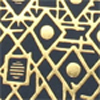 Anyone that manages to weave a mystery around them are bound to win some fascination from appreciators and press alike. Whether or not there's any substance behind their mystery is another story altogether. Uton unveils floating events and sounds in the same way a magician unleashes doves from a hat or a sleeve, but without the awe or sense of wonder. Mystery Revolution amounts to a bunch of floating stuff and very little more.
Anyone that manages to weave a mystery around them are bound to win some fascination from appreciators and press alike. Whether or not there's any substance behind their mystery is another story altogether. Uton unveils floating events and sounds in the same way a magician unleashes doves from a hat or a sleeve, but without the awe or sense of wonder. Mystery Revolution amounts to a bunch of floating stuff and very little more.
Digitalis
At first I thought the cloud of popping and cracking sound that Uton opens this album with was going to resolve into a soft commotion of rhythm and melody. "Aikavirta" suggests crescendo and prologue, the slow accumulation of tension that makes every release such a wonderful feeling. I waited and waited somewhere until I realized that what I was hearing composed the whole of the album. I like abstract music a lot, but the best abstract has to offer always makes some reference to form and structure. Even the most nebulous albums ranked among my favorites feel as though they're traveling somewhere. If not, they're sustaining some sound, thought, or feeling that warrants such stasis. Mystery Revolution, on the other hand, begins adrift and ends adrift, without much in the middle to suggest a journey ever occurred.
Flutes, whistles, bells, chimes, analogue bellows, and all manner of fascinating source material manages never to come together for Uton. Whatever mystery his foggy music hides stays that way until they very end, negating and reflecting any light that even comes close to it. Strings buzz and shift restlessly on "Taivaan Sini Sokea (Soikea)," but never do more than that. They don't necessarily match very well with the other sounds on the song, they do not add to whatever sensation the song inspires (in my case, I feel almost nothing listening to this record), and they certainly don't seem to be arranged very well, becoming lost in the rest of the music. Everything seems to be arranged without forethought or plan.
Improvised music has its place and there are plenty of people who will swear by the possibilities it presents to the musicians and the audience when it is performed, but in this particular case all I get out of listening to this record is a little bit of frustration. Uton has a knack for picking out some interesting noise, but his talent for arrangement is his Achilles' heel.
samples:
Read More

